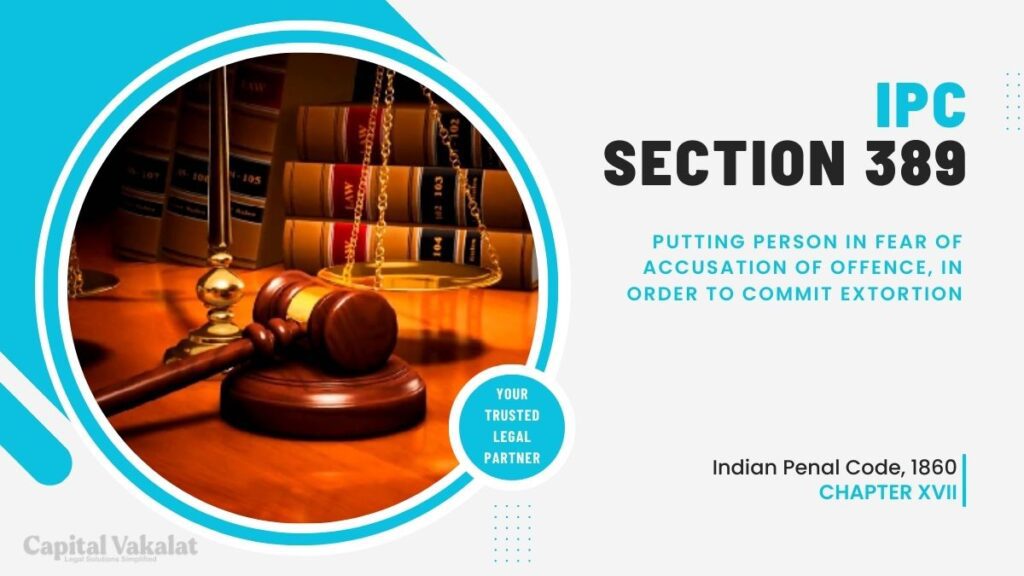Section 389 of the Indian Penal Code (IPC) addresses a critical aspect of criminal law related to extortion. This provision deals with putting a person in fear of an accusation of an offense to commit extortion.

In this article, we will delve into the intricacies of Section 389 IPC, exploring its definition, historical context, legal consequences, and its impact on both individuals and society.
Understanding Section 389 IPC
Section 389 IPC outlines the criminal offense where an individual uses the threat of accusing someone of a crime to extort money or compel them to act against their will. To comprehend the gravity of this offense, it’s essential to explore the elements that constitute a violation of Section 389.
This provision has evolved over time, adapting to the changing legal landscape. Initially introduced to combat coercive tactics in extortion cases, Section 389 has witnessed modifications to address the nuances of contemporary criminal activities.
Elements of Fear in Extortion Cases
Examining the psychological aspect of fear in extortion cases is crucial. Offenders often employ various tactics to instill fear in their victims, ranging from threats of false accusations to manipulation and intimidation. Real-life examples underscore the severity of these fear-inducing tactics, emphasizing the need for a robust legal framework.
Understanding fear as a crucial element in such cases is pivotal to unraveling the complexities surrounding Section 389 IPC. The article will shed light on specific instances where fear played a pivotal role in the commission of extortion.
Legal Consequences of Violating Section 389 IPC
Individuals found guilty of violating Section 389 IPC face severe legal consequences. The penalties and punishments are designed to deter potential offenders and protect the rights of the victims. Case studies illustrating judicial decisions in such matters will provide insights into the application of the law and its impact on the legal landscape.
The article will explore how the judiciary interprets and applies the law in cases involving Section 389 IPC, emphasizing the role of legal precedents in shaping its implementation.
Challenges in Prosecution
Proving fear as an element in extortion cases poses significant challenges. The legal system encounters difficulties in establishing the subjective experience of fear in victims. Additionally, offenders often exploit legal defenses to evade prosecution. The article will delve into these challenges, offering a comprehensive view of the complexities surrounding the prosecution of Section 389 IPC cases.
Landmark Cases and Precedents
Examining landmark cases and legal precedents is instrumental in understanding the evolution and interpretation of Section 389 IPC. Notable cases that have shaped the understanding of this provision will be discussed, highlighting the nuances of legal interpretations and their implications.
Legal scholars, practitioners, and the general public will benefit from an in-depth analysis of how courts have interpreted and applied Section 389 IPC over the years.
Prevention and Safeguards
To address the vulnerabilities associated with false accusations and extortion, it’s essential to explore preventive measures and safeguards. The article will discuss practical steps individuals can take to protect themselves from falling victim to such tactics. Moreover, the role of legal awareness and community support in preventing extortion cases will be emphasized.
Impact on Victims and Society
False accusations and extortion have profound psychological and social implications on victims. The article will delve into the lasting effects on individuals who have been subjected to false accusations under Section 389 IPC. Moreover, it will explore the broader societal impact, emphasizing the need for support systems and awareness campaigns to address these issues.
Recent Amendments and Updates
Any recent amendments or updates to Section 389 IPC will be examined, providing readers with the latest information on legislative changes. Public and legal responses to these changes will be analyzed, offering a well-rounded perspective on the contemporary relevance of Section 389 IPC in the legal framework.
Conclusion
In conclusion, Section 389 IPC plays a pivotal role in addressing the intersection of false accusations and extortion. By exploring its definition, historical context, legal consequences, challenges in prosecution, landmark cases, prevention measures, and societal impact, this article aims to provide a comprehensive understanding of the intricacies surrounding Section 389 IPC. Upholding justice and protecting individuals from false accusations remain paramount in ensuring a just and equitable society.
Frequently Asked Questions
What are the typical legal defenses used in cases involving Section 389 IPC?
Legal defenses often revolve around challenging the evidence of fear or establishing a lack of intent to commit extortion. Knowledgeable legal representation is essential to navigate these defenses effectively.
Are there any recent amendments to Section 389 IPC?
As of my knowledge cutoff in January 2022, I don’t have information on specific amendments. It’s advisable to consult the latest legal sources for the most up-to-date information.
How does Section 389 IPC contribute to the broader legal framework?
Section 389 IPC addresses a critical aspect of extortion cases, providing a legal framework to combat fear-inducing tactics. Its role is essential in maintaining justice and protecting individuals from coercive activities.
What societal measures can be taken to prevent extortion cases under Section 389 IPC?
Promoting legal awareness, fostering community support, and advocating for social initiatives that address the root causes of extortion can contribute to preventing such cases in society.